-
- Regional Training Course
- ‘’Legal& regulatory framework, regulatory role and functions, licensing processand basic safety requirements for NPP’’
- Hammamet- April 08 – 12, 2013
- (organized by ITER and ANNuR)
The training course,
organized as ‘’regional course’’ with the support of ANNuR (Arab Network of
Nuclear Regulators) had the objective to present and discuss the requirements
associated to the process: to develop the legal and regulatory framework, to
define the roles, to establish the appropriate regulatory responsibilities,
competences and functions and introduce the main aspects of safe design and
safety requirements for NPP.
|
|
During the course the
Arab participants have given a short presentation of the current status of
development of the institutions and program related to nuclear and radiation
safety in their country.
|
|
-
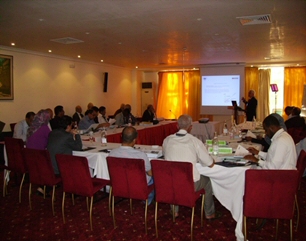
|
|
The team of attending
trainees (24 people from Nuclear Regulatory Authority, TSO and other
institutions of 9 Arab countries members
of ANNuR: Tunisia, Morocco, Yemen, Mauritania, Iraq, Egypt, Libya, Sudan, Jordan
) has shown to be very interested interacting continuously, asking questions
and comparing their view with the concepts and information presented during the
lectures.
|
|
-
- Training
Course
|
The training course on
“Radiation Protection and Regulatory Emergency Preparedness’’ organized in the frame of the project
INSC MC.03/10 Lot 1 by SCK-CEN, SNSA and ITER had the objective to present and
discuss the radiation protection and the basic key aspects of the emergency
planning and emergency preparedness, with focus on the role of the regulator.
|
-
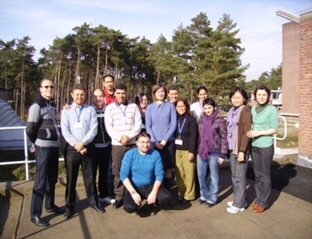
|
The
training programme has been tailored on purpose in order to put an important
accent on specific items as the structure and content of an Emergency Plan and
the emergency zoning, definition of
roles and identification of responsibilities of Government, Operator and
Regulator, and their interfaces, links with international conventions and
obligations, transfer process of released radionuclides, monitoring, management
of contamination and dose limits associated to countermeasures to protect the
population.
Thistraining targeted also at underlining the role of the regulator in supporting
the government in decision making during an emergency and illustrating some
lessons learned from Fukushima accident.
Practicalapplications have been included in the program on the topics:
- A)
Emergency Preparedness
- B)
Exercise of the Emergency Plan.
-
·
|
The training week included
also a visit to the SCK-CEN emergency room, the anthropo-gammametry lab and the
decontamination wing giving opportunity to the trainees to get direct evidence
of the way emergency issues are practically treated and organized. 14 trainees from NRA and
TSOs from Armenia, Belarus,
Ukraine, Malaysia, Morocco,
Vietnam, Egypt, Jordan, Brazil, Philippines,
|
-
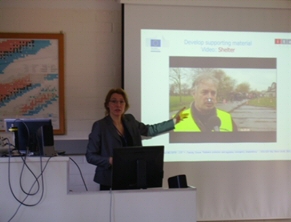
|
|
Mexico,
Indonesia attended and have acquired knowledge with honors undergoing a
multiple choice questionnaire. Twotrainees respectively from Jordan and from Vietnam remained at SCK-CEN to
devote themselves to the back to back
Tutoring of 2 months on the same subject.
|
|
|
Education &
Training
(opportunities offered by ITER-Consult)
|
ITER-Consult pays particular attention to the
Education and Training in the field of
institutional capacity building with focus on
the development of nuclear national
infrastructure, legislative basis and regulatory
framework and on the development of technical,
management and supervision capacities on the
side of regulatory authorities and TSO
organizations.
Formation and training opportunities, including
tutoring, are offered over a spectrum of courses
performed by national and international high
level experts.
|
The courses are organized for university
graduates and for staff with some professional
experience. The duration of courses can vary
from one week to a few months and can be
tailored on the needs request of the trainees
and belonging organizations.
The formation and training sessions include:
legislative basis and regulatory framework;
|
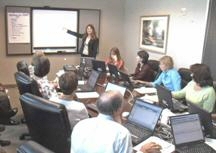 |
role, functions and responsibility for
regulatory licensing and supervision activities;
regulatory licensing review management;
safety requirementsfor siting of NPP and safety
review activity; regulatory capability to
establish safety objectives and criteria for NPP
and other NF, approach and key aspects for
safety evaluation of the ‘’conceptual design’’
of a NPP at integrated level; objectives,
requirements and use of PSA; formation on main
issues related to RW management and related
regulatory requirements; basic competencies in
radiation protection for workers and public;
safety design criteria and safety requirements
with introduction to applicable codes for safety
review of civil structures, mechanical
structures and equipment of NPP and other NF,
seismic design safety requirements for SSC,
environmental and seismic qualification of
safety related equipment, accident analyses and
application of T/H code. Some draft training
cards are provided below.
|
|
-
-
- Training
Activities
- (in the
frame of EC Cooperation Programs)
|
-
In the framework of EC assistance thorough
the INSC program a training course has been
held ‘’NPP SITING REQUIREMENTS’’
together with STUK and IRSN at ITER
premises in Vicovaro (Roma) - May 24-28,
2010.
A
training course has been held on
‘’Regulatory role, function, organization and
licensing process’’ together
with STUK at JNRC in Amman on Oct. 31 – Nov. 4,
2010
|
-
-
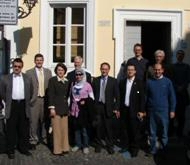
|
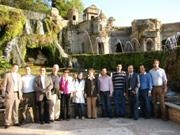 |
|
A training course will
be held on ‘’ Expert review of NPP
conceptual design and QMS’’ together with IRSN,
STUK, BELV at JNRC in
Amman on April 2011. |
|
-
- International
Technical Meeting
- "Seismic Safety of
NPPs"
- Tivoli (Italy) - March
25-26, 2010
Seismic safety of Nuclear Power Plants is a
key subject deserving particular consideration
in the use of nuclear energy. Moreover this
issue is a major concern in public opinion
especially in countries with a moderate to high
seismicity and it has significant impact on
the development of nuclear energy programs. |
-
Substantial attention needs to be paid to
the seismic safety of NPP while developing a
nuclear program.
In this perspective a Technical meeting on the
‘’Seismic Safety of NPP’’ is organized
with the main objective to exchange views and
discuss main topics of seismic safety of NPP
using international in-progress studies and
research activity, lessons learned from
experience, current design and regulatory
practices.
|
|
-
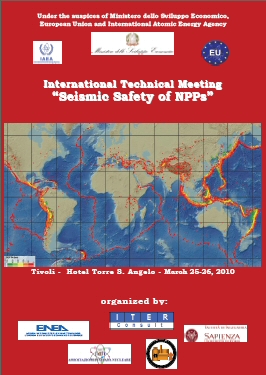
|
|
The technical Meeting has been organized by
ITER-Consult, CIRTEN, ENEA, ‘’La Sapienza’’ and AIN
with the support of IAEA and under the auspices of
the Ministry of Economical Development of Italy.
-
The participating organization included IAEA,
ISPRA, ITER, ENEA, Ansaldo, Areva, JNES,
IRSN, CIRTEN, ‘’La Sapienza’’.
More information |
|
-
-
Formation Course
- "National Nuclear
Infrastructure and Institutional Capacity"
-
Palermo (Italy) -
September 14-18, 2009
Within the G8 NSSG initiative to promote an
effective cooperation among institutions, academic
communities and organizations and in order to
strengthen the cooperation on Education &Training
and the sharing of best practices for a safe and
secure development of a nuclear programme, a course
on nuclear infrastructure was organized in Palermo
on September 2009. |
|
The course was organized by ITER-Consult with
DIN and CIRTEN under the auspices of: Italian
Ministry of Foreign Affairs, Italian Presidency
of G8, EU, IAEA and University of Palermo.
The course focused on the development of the
legal and regulatory framework, the definition
of roles and the establishment of appropriate
regulatory responsibilities and functions.
It introduced the basis and discussed the
requirements associated to such a process,
including lessons learned from experience with
the aim to provide:
|
-
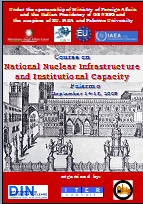
|
-
·
a comprehensive view of different approaches for
establishing the legal and regulatory framework;
-
·
a specific knowledge of requirements of legal
framework and international conventions;
-
·
insight into the regulatory role, function and
capability.
More information |
|
|
Training Course
"Regulatory practice
and safety requirements for SAR of RW storage facility"
Vicovaro- Roma (Italy) - June 22-26, 2009
The
storage of radioactive waste is a necessary stage in
the pre-disposal management of radioactive waste
consisting in the placement of radioactive waste in
a specific facility where appropriate isolation and
monitoring are provided and designed to last for a
period of at least tens of years. |
|
For
licensing purpose the Applicant needs to demonstrate
that the proposed Radioactive Waste Storage Facility
(RWSF) will meet the required level of protection by
carrying out a safety assessment and presenting a
SAR that analyze the organizational and technical
arrangements put in place, the nature of the waste
to be accepted, the characteristics of the site, the
|
-
design of the facility, including engineered
safety barriers, and the arrangements for
its construction and operation.
-
MAIN FEATURES
-
The Training Course activity covers the
following disciplines: radiological safety
objectives, safety assessment, organizational
and operational requirements, waste acceptance
criteria, site analysis, design, construction
commissioning and operation, operational limits
and conditions, regulatory inspection.
|
|
|
|